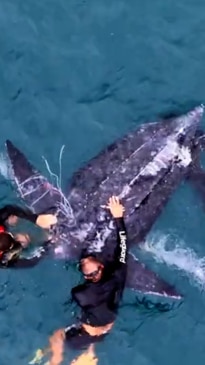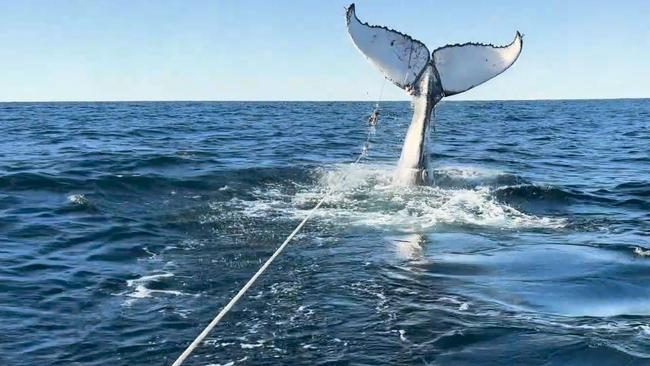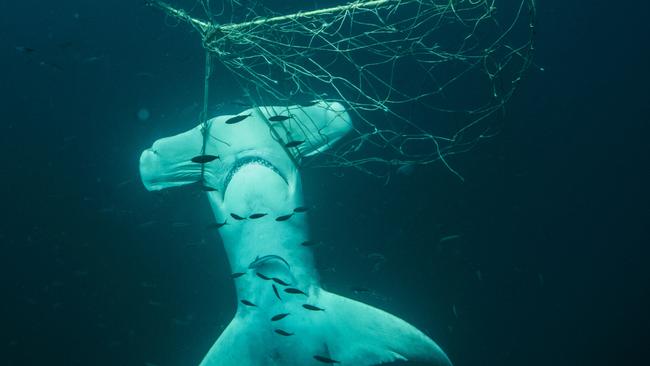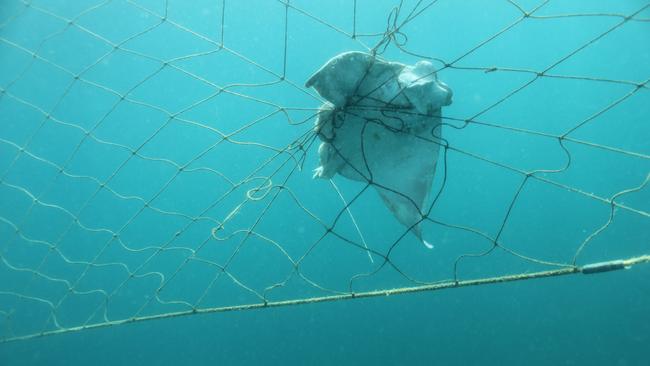Village Roadshow Theme Parks COO Bikash Randhawa weighs in on existing shark control methods
Queensland and the Gold Coast are about to ‘review’ shark nets in the wake of New South Wales limiting their use. Read the latest

Gold Coast
Don't miss out on the headlines from Gold Coast. Followed categories will be added to My News.
A NSW reduction in shark net use is sparking renewed debate on Queensland’s approach, with a Gold Coast tourism boss calling for improvements to lessen marine life impacts.
Village Roadshow Theme Parks chief operating officer Bikash Randhawa, whose Sea World rescue team regularly responds to marine life entangled in Gold Coast shark nets, said Village was working with the Queensland government in the hope of improving existing shark control methods.
Environmentalist and research groups have called for removal of shark nets off the Gold Coast during winter months at a minimum, in line with NSW. Those groups cite a growing number of unintended marine life catches and increasing number of humpback whales in our waters.
Queensland’s Shark Control Program is set for a major review later this year, with a new shark management plan proposed for 2025 to 2026.

However, a spokesman for the Department of Agriculture and Fisheries (DAF) said no changes would be made to shark nets until the review was completed and effective alternatives suitable for Queensland conditions were identified and proven.
It comes as NSW announced last week shark nets would be removed a month earlier next year in order to protect marine life.
Mr Randhawa, dipping his toe in the debate, said Sea World “aims are to support local and global marine conservation issues and educate our community on how they can assist”.
“We understand the pressure on governments to protect swimmers through the use of shark control programs.
“We continue our rescue operations to save marine animals that become entangled within the shark control programs, along with working with the authoritative agencies to research improved methods which will lessen the impact on our marine life,” he said.
“We have also partnered with the Queensland government with their SharkSmart program installed in park to educate our guests on how to remain SharkSmart in the water and the new technologies being used to monitor sharks and keep people safe, in the aims of sparking conversation and change to existing shark control methods.”

Bond University shark researcher Dr Daryl McPhee said shark nets were becoming outdated and the state needed a transition plan to ensure an effective shark control program addressing both human and marine safety.
A shark attack would be the worst outcome in the lead-up to and during the 2032 Olympics with the eyes of the world on southeast Queensland, he said.
However, Dr McPhee added a whale entanglement would also generate negative publicity – and was much more likely.
“When you survey the community there is not a lot of support for shark nets, and it’s a huge burden on Sea World’s resources undertaking all these rescues,” the associate professor of environmental science said.
“There is data that shows shark nets can make some difference, but we need a vision of where we want to be by 2032 and then have a plan of how to get there, we need time to trial that and find an option that suits the community.
“It is difficult for governments because Murphy’s Law is the week you remove the nets there would be an attack. Fortunately there is a lot of new technology that looks very promising as a replacement to the old-fashioned nets.”
A DAF spokesman said the Queensland government had committed $1 million a year to research and trial alternatives to existing shark control equipment, and a further $2 million a year to the SharkSmart drone trial.


The drone trial, launched in 2020 and continuing until next year, operates at 10 beaches from the Gold Coast to Townsville.
“Artificial intelligence solutions to improve the effectiveness of drones for detecting sharks are also being tested,” the spokesman said.
“The aim of AI is to automatically identify sharks in the water in real time and alert the drone pilot. This will reduce pilot fatigue and the chance of human error.
“Less than 10 whale entanglements are reported on average each year, which is very low considering an estimated 45,000 whales migrate along the Queensland coastline annually.
“We will always put the safety of people first.”
Marine scientist Dr Asia Haines, a researcher with the ‘Project Manta’ manta ray program, said she did not see any benefit in shark nets.
She said community education and consultation could also have an effect, with the NSW community of Ballina rejecting the nets two years into a three-year trial.
“In places (like the Gold Coast) where the nets have been there forever it’s more challenging,” she said.
Environmental group Envoy Foundation founder Andre Borell said the Queensland government had ignored scientific advice to remove nets during winter, with data showing 138 marine animals aside from sharks were captured by nets or drum lines last year.
“The proactive approach from NSW (to remove nets during winter) has notably decreased humpback whale entanglements off their coastline, to almost zero,” he said.
“We just don’t understand why the Premier of Queensland and other key ministers refuse to support the repeated and consistent recommendation from their own Queensland Shark Control Program’s scientific working group to remove nets during the annual humpback migration.”
More Coverage






